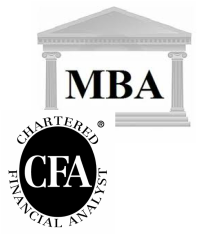 by Girl Banker® Listen to the iTunes podcast instead. This blog is designed to help those with 3 to 7 years of experience in a non-financial institution plan their strategy for moving into banking. What does an MBA involve? One or two years of dedicated learning and networking. An MBA class at a top school is composed of ex-Bankers as well as people with several years of experience from many other industries. After the MBA, when these people apply to investment banks, they are considered on an equal basis for investment banks' MBA programs. MBA-hires normally start as first year Associates and some as third-year Analysts: it depends on the value of work experience that they bring with them. Some investment banks will not even consider people with MBAs for Analyst roles. So if, relative to the rest of the MBA class, your work experience does not stand out, you could still struggle to get a job. US business schools typically offer a two year course whilst in the UK they are usually one year. London Business School is the only UK school I know of that offers a two year MBA. There is some perception, that two year MBAs offer a more in-depth education. What does the CFA involve? Three exams done over 18 or 24 m. The fastest you can complete the CFA program is 18 months: Level 1 in December, Level 2 in June the following year and Level 3 the June after that. If you miss the December sitting for Level 1 then the CFA would have to be done over two-years. And that's assuming you pass all levels the first time - only 35-45% are allowed to pass any one sitting. This means the probability of passing all three exams the first time is 4.3%-6.4%. Eek! Don't worry, if I can do it, so can you. 1. What is the level you want to enter banking at? Ex-bankers that leave banking to do an MBA normally come back as Associates. If you have valuable non-banking industry experience and CONTACTS alongside your MBA, you too will enter as an Associate. If the investment bank doesn't value your pre-MBA experience you will find it challenging to enter as an Associate. You would have better luck applying as an Analyst - the bottom rung - but keep in mind that some investment banks won't allow you to do this: they will insist on putting you up against other MBAs. In this case you would need to find a bank which accepts MBAs entering as Analysts. If you do the CFA you will still enter as a first year analyst but doing the CFA will make your CV stand out.  2. How much money are you able to spend? MBA US Business Schools: Costs are relatively similar at top US business schools, give or take $5-10k. I'll use Harvard as an example. The cost of tuition, insurance and living per year is estimated to be: $87,200 for a single person $101,800 for a couple $113,500 for a couple with one child $121,200 for a couple with two children Assuming you're single, that's $174,400 (£109,000) in MBA costs over the 2 years (GBPUSD=1.6). UK Business Schools: Tuition at London Business School is £57,500 for their full 15-21 month program. With £15-20k per annum in living costs you're looking at a total of £85-100,000 ($136-160,000) over the 2-year period. Cambridge's Judge Institute charges £36,000 and Cass Business School costs £34,500 for tuition. Both have a 1-year course. Again, add £15-20,000 for living and you're looking at a total of £50-60,000 ($80-96,000). CFA Schweser self-study materials (which most candidates use) cost $350-600 per exam. The cost of each exam is $1,125-$1,500 depending on how early you enrol and register. This means that over the three levels, assuming you go for the more expensive study materials but register for the exam early the cost would total c.$5,175 ($1,725 times 3). However, you never have to fork out more than a couple of grand at any one time. Indeed, as it's done alongside your day job you don't need to set aside living costs. Note that you will fork out more than the above if you decide to go on a taught course. 3. How much time are you willing / able to dedicate to getting into banking? Personally, I think it would be challenging to do an MBA part-time. MBAs are not just about the learning material, they are about networking. Half the reason of doing an MBA is to develop a cache of contacts that will help to progress your career. If you go to business school and come out with just a certificate, you haven't made the most of that opportunity. The CFA program on the other hand is designed to be done part time. Level 1 can only be written in June or Dec. Levels 2 and 3 can only be taken in June. If you fail level 2 or 3, you have to wait a whole year to re-write. In summary, Note that MBAs are much more part of US culture than they are in the UK. Here in London, they are less of an expectation. Both the MBA and the CFA are valuable, however, the MBA is a bigger commitment in terms of time and money. With the current recession, neither can guarantee a job in investment banking but they can help to differentiate you.
6 Comments
mikel
11/8/2016 10:48:59 am
thanks for your posts. What is your opinion on studying CFA for a career change towards Financial Management? I am not looking at investment banks, but more at financial positions inside technology firms. thanks very much in advance.
Reply
Heather as "Girl Banker"
11/8/2016 10:49:57 am
From my experience of the CFA, I would say it is not suitable for Finance inside a tech firm or in other industry. I think there must be better qualifications for that. I haven't looked at the curriculum but perhaps the ACA (big sister to ACCA) would be a better qualifications? Have you had a look at that?
Reply
mikel
11/8/2016 10:50:26 am
Thanks very much for your reply and comments. Much appreciated!
Alex
11/8/2016 10:50:46 am
I like your break down of the two - but it seems that you lack an opinion as to what to strive for. So what if someone works in finance, could easily do both, but wants to make a judgement call as to what they should go for first? my thought - cost wise as a guy with student loans - is that the CFA makes a lot of sense. Please advise.
Reply
Heather as "Girl Banker"
11/8/2016 10:51:15 am
Thanks for the comment. I do not lack an opinion on the matter.
Reply
Darin
11/8/2016 10:51:45 am
I'm 25 and currently working in a science lab. After working there for 2 years, I realize that this is not the field I want to be in. Is it too late to get into investment banking? I have no finance background.
Reply
Leave a Reply. |
Girl Banker®I created my investment banking blog in 2012 as soon as I resigned from i-banking & published my book, To Become An Investment Banker.
Initially published at girlbanker.com, all posts were later subsumed into my personal website under katsonga.com/GirlBanker. With 7 years of front office i-banking experience from Goldman Sachs and HSBC, in both classic IBD (corporate finance) and Derivatives (DCM / FICC), the aim of GirlBanker.com was to make it as straight-forward as possible to get into a top tier investment bank. I'm also a CFA survivor having passed all three levels on the first attempt within 18 months - the shortest time possible. Categories
All
Archives
August 2017
|
Heather Katsonga-Woodward, a massive personal finance fanatic.
** All views expressed are my own and not those of any employer, past or present. ** Please get professional advice before re-arranging your personal finances.

 RSS Feed
RSS Feed





